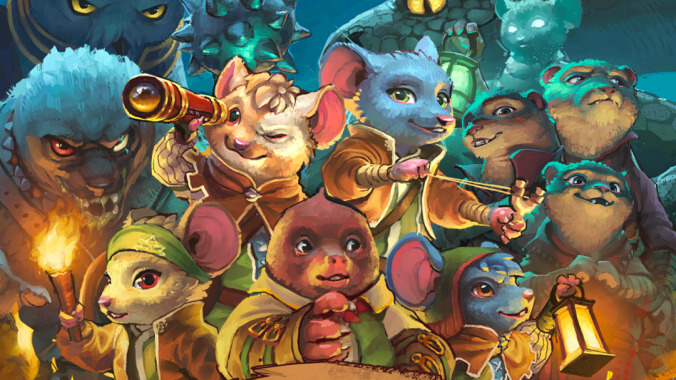The Redwall books are just sitting there, waiting for a big, fun adaptation
With two new video game tie-ins now available, it's clearer than ever that the children's fantasy series deserves a spotlight

Forthright Entertainment and Soma Games released a couple of small video games this week based on Redwall, the beloved children’s fantasy series written by the late Brian Jacques. They are, effectively, the first time the franchise has been touched in over a decade, when Jacques’ final book in the series—2011’s The Rogue Crew—was released posthumously. That means, for 13 years, every Hollywood studio has either ignored Redwall or failed to make any adaptations of its epic saga about heroic medieval mice and villainous foxes materialize. In an industry where everyone is always on the lookout for the next hot IP, Redwall deserves a chance.
The issue, if you want to call it that, is that Redwall requires a little more creative effort than something like Game Of Thrones (we’re calling you out, HBO). Because, as noted above, it happens to be about mice who live in and around the eponymous Redwall Abbey. They talk, they wear clothes, they carry swords, and they engage in elaborate, lovingly detailed feasts (it makes perfect sense that one of Soma’s games, Feasts & Friends, is entirely about cooking).
It’s hard to depict a lot of that in live-action without some particularly well-trained rodents, which means animation (like the Canadian Redwall cartoon from 1999) or—if we want to imagine something extremely mega-cool—Fantastic Mr. Fox-style stop-motion. Both of those are more complicated than putting an actor in armor and a big cape (again, eat your heart out, HBO), but if someone with enough money and patience could get past that low bar, they could have something genuinely special on their hands.
See, Redwall didn’t run for more than 20 novels because it’s just about mice fighting snakes and stoats and martens and other little animals that are all basically variations on the classic weasel. The books also have an undercurrent of hope and joy and the eternal value of fighting for peace or the safety of your fellow man (or mouse).
There’s a reason the books are all set in and around an abbey and not a fortress or a castle—and the abbey is even agnostic (at most), so this isn’t a C.S. Lewis-style fantasy world where everything conveniently looks a lot like Christianity. The real world is often awful, and there’s something to be said about fantasy that is, you know, a fantasy; a world that is simple and nice with good guys and bad guys and everyone’s an anthropomorphized woodland critter.
The original books could be a little black-and-white in their morality, with a character’s goodness or evilness almost entirely determined by what kind of animal they were, which is a problem, but the books were explicitly targeted to kids and that kind of thing could be read as a feature and not a bug if you read it as a comforting trope (perhaps a twist on the conceit of elves being good and orcs being bad in other fantasy worlds). Besides, it’s not just mice who are good creatures, it’s every little guy who is typically considered cute: Badgers, otters, squirrels, and birds are all nice.
Now just imagine a bunch of mice and otters and squirrels sitting at a big table under the tapestry depicting iconic hero Martin The Warrior, eating honey-baked apples and wearing adorable little cloaks. Then some vile weasel or weasel-like thing barges in, kidnaps some little baby hedgehogs, and everyone in the abbey grabs their tiny little swords to go on a rescue mission. Redwall stories follow a basic formula like that, but a quietly brilliant twist that Jacques built into the books is that they (almost) all take place years apart from each other, so the plot of one book might become an important myth or historical event in another, and the characters in one book might be remembered as legendary heroes later on in the series.
That gives the series a built-in cinematic universe quality, with tons of characters who are informed by past generations and inform future generations themselves, which rewards longtime fans without necessarily alienating newcomers. That’s something you can’t put a price on when you’re building an adaptation, because you don’t have to lean on any one character and you can branch out into spin-offs or tie-ins whenever you feel like it.
Netflix actually saw the value in all of this a couple of years ago, when it picked up the rights to Redwall and tasked Over The Garden Wall creator Patrick McHale with writing an animated Redwall movie. The project unfortunately fell apart shortly after that, when the streaming service used its animation department as a scapegoat after it missed subscriber goals in 2022, and McHale suggested that—while he was no longer involved—Netflix was still interested in a TV show of some sort.
It’s unclear if Netflix is still working on that, or anything related to Redwall, but it would be a real shame if this series gets forgotten now that Jacques has passed away. It’s heartwarming that Soma Games is carrying the little mouse-sized torch for Redwall, and both Feasts & Friends and the more action-oriented Lost Legends Of Redwall: The Scout Anthology will hopefully lead to more Redwall stuff from the studio, but, ironically, this series about tiny little guys deserves to be even bigger.
The Lost Legends Of Redwall: Feasts & Friends is out now on PC. The Scout Anthology is available on PC, Mac, PlayStation 5, and Xbox Series X/S.